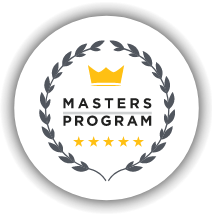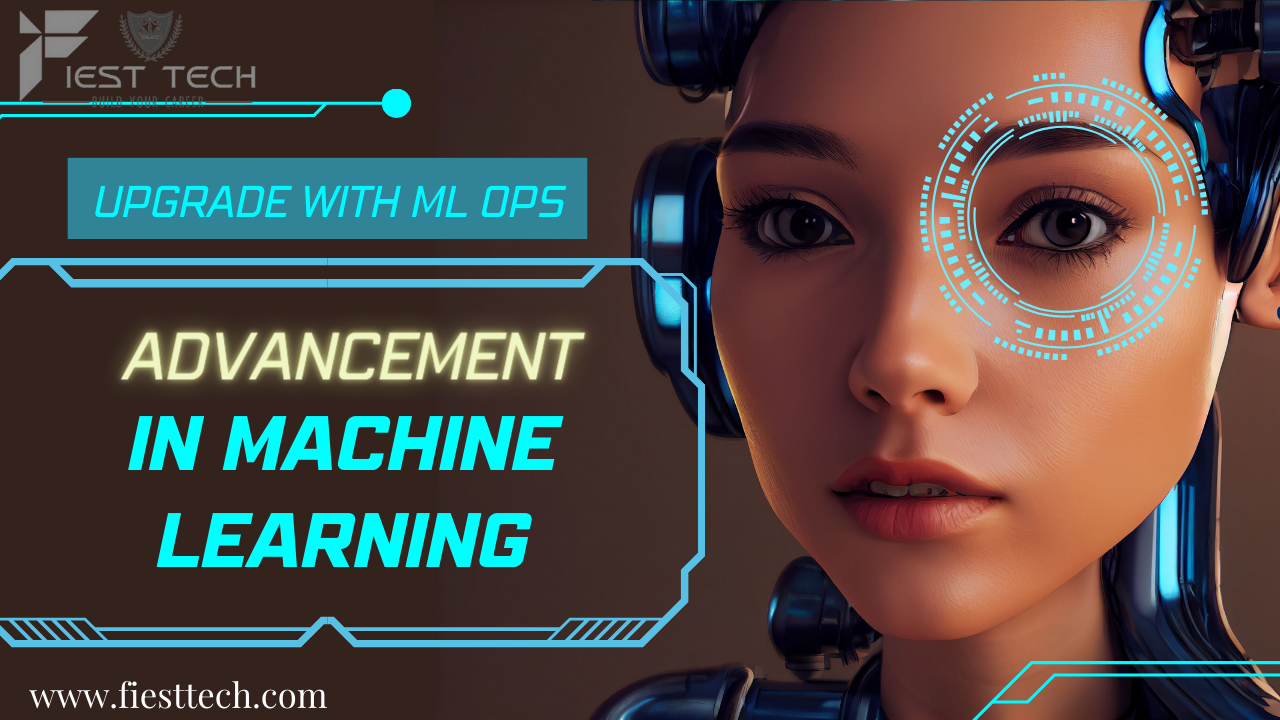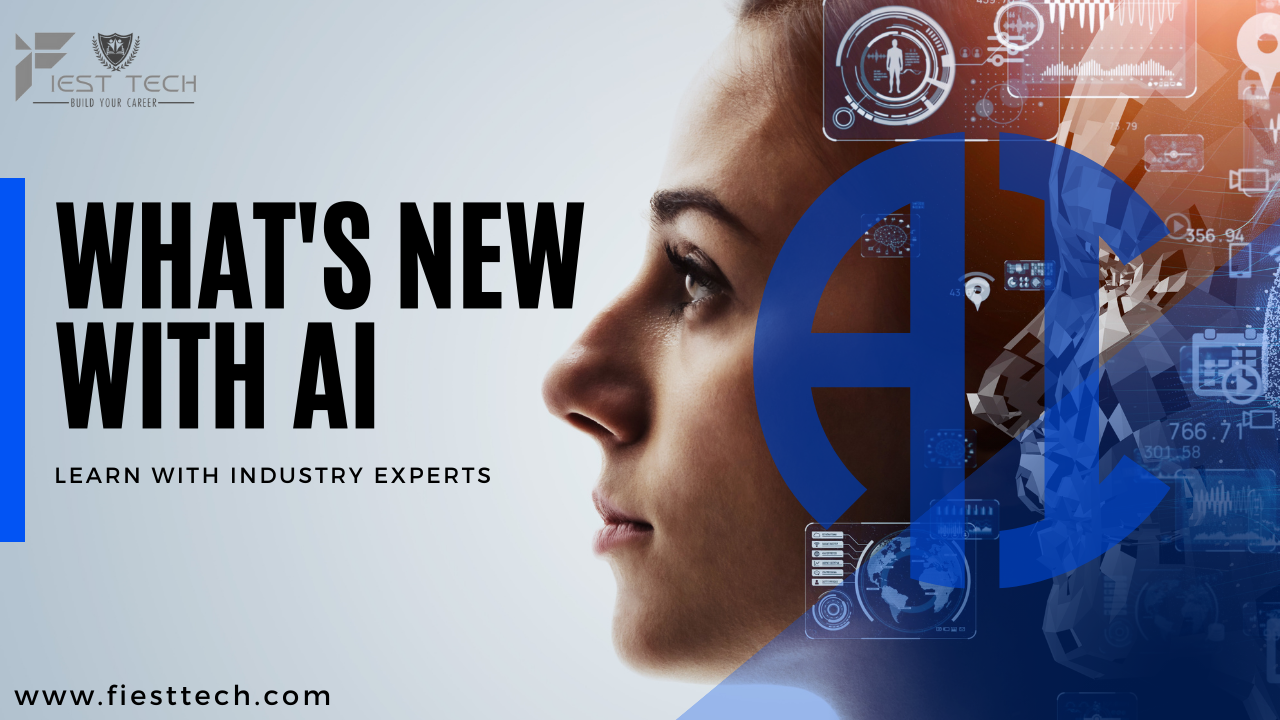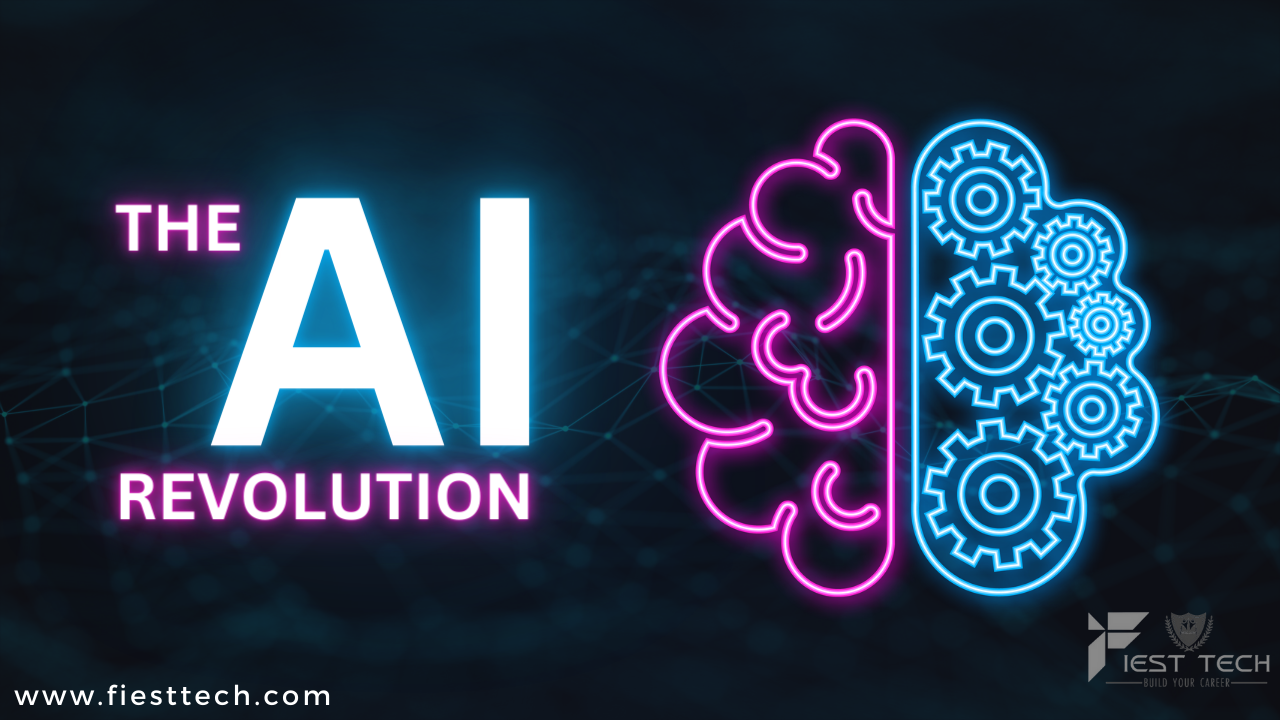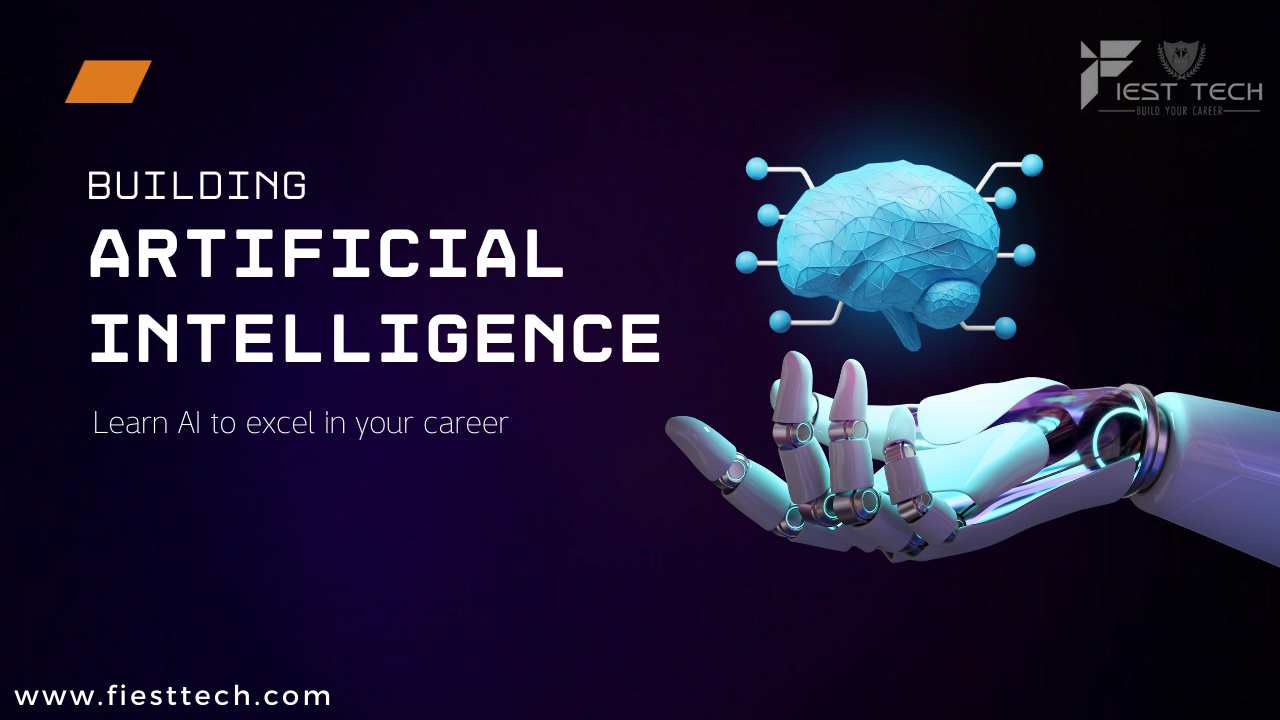AI Engineer Course Overview
The AI Engineer Bootcamp from FiestTech is a thorough self-paced guided program for AI enthusiasts wishing to enhance their careers in this exciting subject. The course covers all areas of artificial intelligence, beginning with the fundamentals of math and statistics and the essentials of Python programming and progressing to the solution of complicated problems utilizing Deep Learning and ML Models (Supervised, Unsupervised, and Reinforcement Learning).
Learn the principles of Natural Language Processing, Deep Learning, and Neural Networks to develop next-generation tech skills through extensive hands-on practice with industry professionals and position yourself for the hottest AI jobs. With portfolio reviews, CV evaluations, and mock interviews, the AI Engineering Bootcamp will help you reach the summit of your desired tech profession.
Ai Engineer Bootcamp Key Features
At Fiesttech, we value the trust of our patrons immensely. But, if you feel that this Ai Engineer Bootcamp does not meet your expectations, we offer a 7-day money-back guarantee. Just send us a refund request via email within 7 days of purchase and we will refund 100% of your payment, no questions asked!
- 167 Hours of Live Instructor-led Sessions
- 288 Hours of E-Learning Material
- 130+ Guided Hands-on Exercises
- 9 Capstone Projects for a Job-Ready Portfolio
- 15 Real-World Case Studies
- Weekly Doubt-Clearing Sessions with Experts.
Skills Covered
- Python Programming
- Stattistical Modelling
- Machine Learning with Python
- Deep Learning
- Natural Language Processing
- AI with Transformers
Benefits
Enrolling in a program to learn AI can provide numerous benefits for students. Here are some compelling reasons to consider:
- High Demand and Career Opportunities: AI is one of the fastest-growing fields with increasing demand for professionals skilled in AI technologies. By learning AI, you open up a wide range of career opportunities across industries such as technology, healthcare, finance, manufacturing, and more.
- Future-Proofing Your Skills: AI is expected to have a profound impact on various aspects of society and industry in the coming years. By acquiring AI skills, you position yourself to adapt to and thrive in a technology-driven future. It helps future-proof your career by staying ahead of the curve.
- Problem-Solving and Critical Thinking: Studying AI cultivates problem-solving and critical thinking skills. AI involves analyzing complex data, developing algorithms, and making informed decisions based on the results. These skills are transferable and valuable in many other areas of life and work.
- Innovation and Entrepreneurship: AI presents significant opportunities for innovation and entrepreneurship. By learning AI, you gain the knowledge and tools to develop AI-based products, services, and startups. This allows you to create groundbreaking solutions and contribute to technological advancements.
- Interdisciplinary Applications: AI intersects with various disciplines, including computer science, mathematics, engineering, psychology, healthcare, and more. Learning AI provides you with a versatile skill set that can be applied in multiple fields and allows for interdisciplinary collaboration.
- Data Analysis and Insights: AI relies heavily on data analysis to extract meaningful insights and patterns. Learning AI equips you with the skills to work with large datasets, apply statistical techniques, and draw valuable conclusions. This skill is valuable in fields where data analysis is crucial, such as business, finance, and research.
- Collaborative Projects and Networking: Learning AI often involves working on collaborative projects and participating in AI communities. This provides opportunities to network with like-minded individuals, share ideas, and collaborate on cutting-edge projects that have real-world impact.
- Intellectual Stimulation and Curiosity: AI is a fascinating and rapidly evolving field. Learning AI can satisfy intellectual curiosity, challenge your problem-solving skills, and keep you engaged in ongoing learning and discovery.
Overall, enrolling in AI learning programs can equip you with valuable skills, open up diverse career opportunities, and prepare you for the technology-driven future. It empowers you to make a positive impact on society, drive innovation, and contribute to the development of AI-driven solutions.
Annual Salary
Hiring Companies

Annual Salary
Hiring Companies
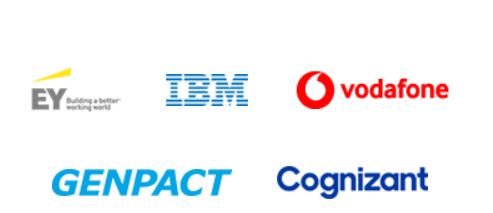
Annual Salary
Hiring Companies

Annual Salary
Hiring Companies

GO AT YOUR OWN PACE
Training Options
Explore all of our training options and pick your suitable ones to enroll and start learning with us! We ensure that you will never regret it!
APPLY
Who Can Apply
-
Data Analytics Professionals
-
Data Engineering Professionals
-
Anyone working in the IT industry
-
Developers who want to transition to AI
-
Students interested in making a career in AI
-
IT professionals aspiring to enter Data Science and AI
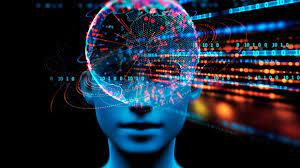
AI Engineer Course Curriculum
FiestTech's AI Engineer Program provides a comprehensive coverage of key topics in AI, allowing students to gain a solid understanding of AI concepts, algorithms, and their practical applications. The course typically includes a mix of lectures, hands-on programming exercises, projects, and discussions to facilitate learning and engagement.
Software Tools and Libraries:
- Familiarity with AI-related software tools and libraries, such as TensorFlow, PyTorch, scikit-learn, and Jupyter notebooks, can be advantageous.
Critical Thinking and Problem-Solving Skills:
- AI often involves solving complex, real-world problems. Developing strong critical thinking and problem-solving skills is essential to succeed in AI.
Course Content
Live Course
Self Paced
-
3.01 - Introduction to Machine Learning
- -
3.02 - Python Basics
- -
3.03 - Data in Python
- -
3.04 - Data Visualization
- -
3.05 - Statistics
- -
3.06 - Advanced Data Analytics
- -
3.07 - Machine Learning Basics
- -
3.08 - Feature Extraction
- -
3.09 - Support Vector Machines and Regression
- -
3.10 - Supervised Learning
- -
3.11 - Unsupervised Learning
- -
3.12 - Dimensionality Reduction
- -
3.13 - Ensemble Machine Learning
- -
3.14 - Association Rules and Recommender Systems
-

Industry Projects
AI & Machine Learning Industry Projects
Ai Engineer Bootcamp Exam & Certification
A certification for AI engineers is a recognized credential that validates your knowledge and skills in the field of artificial intelligence. It demonstrates your proficiency in various AI concepts, algorithms, and practical applications.
Obtaining a certification showcases your expertise and can enhance your credibility as an AI professional. It can help you stand out in the job market and increase your chances of securing AI-related positions. Certifications also provide structured learning opportunities and ensure you have a comprehensive understanding of key AI concepts and techniques.
There are several certifications available for AI engineers, offered by various organizations and platforms. Some popular certifications include:
- TensorFlow Developer Certificate (offered by Google)
- Microsoft Certified: Azure AI Engineer Associate (offered by Microsoft)
- AWS Certified Machine Learning - Specialty (offered by Amazon Web Services)
- IBM Data Science Professional Certificate (offered by IBM)
- NVIDIA Deep Learning Institute (DLI) Certifications
To prepare for an AI engineering certification exam, consider the following steps:
- Review the exam objectives and understand the topics that will be covered.
- Study relevant AI concepts, algorithms, and frameworks.
- Engage in hands-on practice by implementing AI models and algorithms.
- Explore online courses, tutorials, and study materials provided by the certification provider.
- Take practice exams to familiarize yourself with the exam format and assess your readiness.
- Join AI communities, discussion forums, and study groups to exchange knowledge and gain insights from other AI professionals.
The preparation time for an AI engineering certification exam can vary depending on your prior knowledge and experience with AI concepts and technologies. On average, it may take several weeks to a few months of dedicated study and practice to adequately prepare for the exam.
The exam format can vary depending on the certification provider. Typically, AI engineering certification exams consist of multiple-choice questions, coding exercises, and scenario-based problems. Some exams may also require practical demonstrations or hands-on assignments.
The validity period of an AI engineering certification varies depending on the certifying organization. Some certifications are valid indefinitely, while others may require recertification after a certain period, usually ranging from one to three years. It's important to check the specific certification details to understand its validity period.
Yes, many certification providers offer online exams that you can take remotely from your own location. This allows for greater flexibility and convenience in scheduling your exam. However, the exam delivery method may vary, so it's recommended to check the certification provider's guidelines and requirements. It's worth noting that certification exams and their specific details may change over time, so it's important to visit the official websites of certification providers for the most up-to-date information and requirements.
The cost of AI engineering certifications varies depending on the certification provider, the level of the certification, and any additional training materials or resources included. Certification fees can range from a few hundred to a few thousand dollars.
Yes, most AI engineering certification exams are proctored to ensure integrity and prevent cheating. Proctoring methods can include online proctoring with a live proctor monitoring via webcam or on-site proctoring at designated testing centers.
The prerequisites for AI engineering certifications vary depending on the certification program. Some certifications may require prior knowledge and experience in programming, mathematics, and machine learning concepts. Others may have no specific prerequisites and are open to individuals with a general understanding of AI.
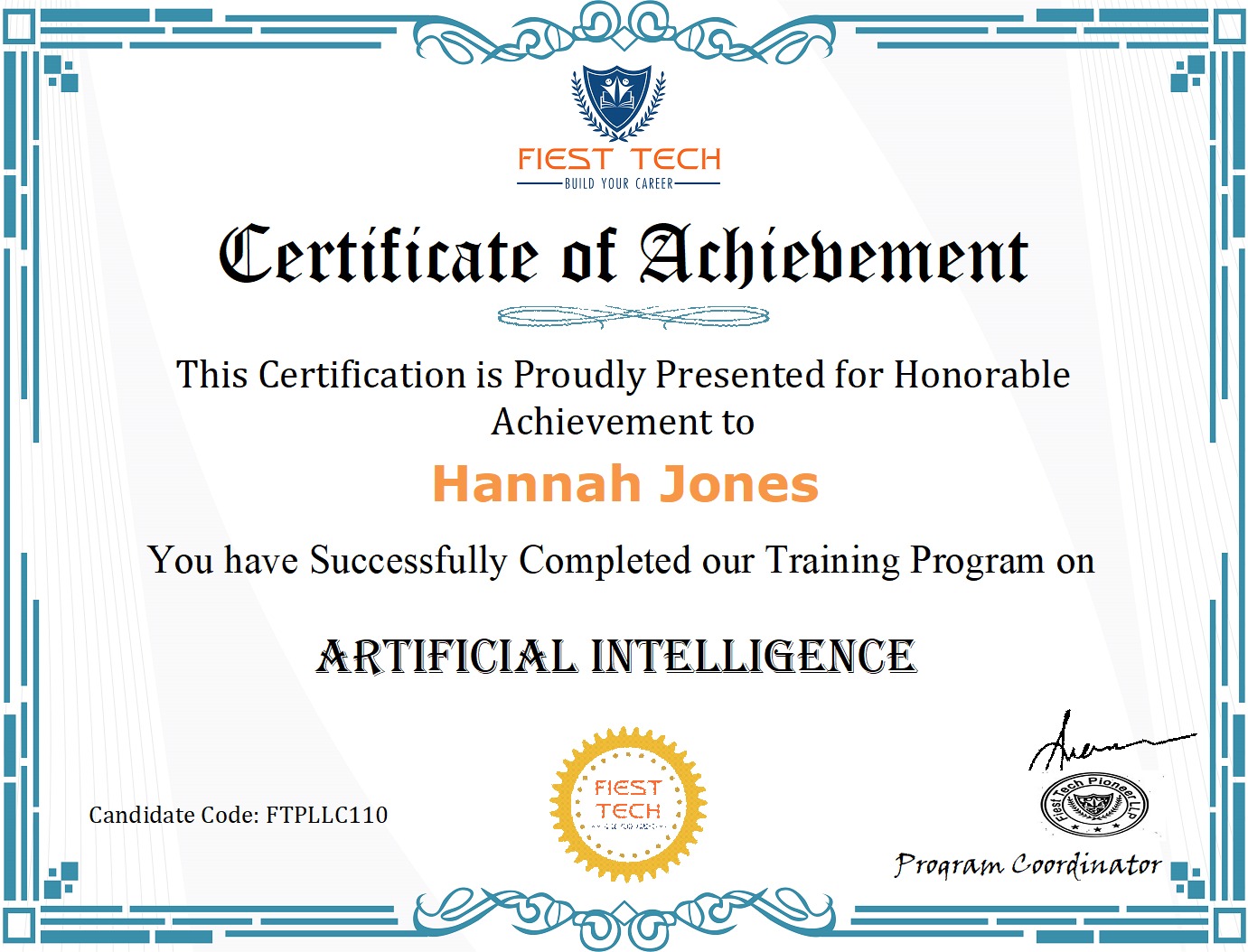
FAQS
Ai Engineer Bootcamp Course FAQs
An AI engineer is a professional who specializes in the design, development, and implementation of artificial intelligence (AI) solutions. They work on various AI projects, such as machine learning, deep learning, natural language processing, computer vision, and data analysis.
To become an AI engineer, you need a combination of technical skills, including:
- Proficiency in programming languages such as Python, R, or Java
- Knowledge of machine learning algorithms and techniques
- Experience with deep learning frameworks like TensorFlow or PyTorch
- Understanding of data preprocessing, feature engineering, and model evaluation
- Familiarity with cloud platforms and tools like AWS, Azure, or Google Cloud
- Strong analytical and problem-solving skills
- Ability to work with big data and utilize data mining techniques
- Knowledge of software engineering principles and practices
While there is no specific educational path for becoming an AI engineer, most professionals in this field have a background in computer science, mathematics, statistics, or a related discipline. A bachelor's or master's degree in one of these fields is common, although practical experience and self-study can also be valuable for gaining AI engineering skills.
AI engineers play a crucial role in designing and developing AI solutions that address specific business problems or objectives. Their responsibilities may include:
- Analyzing business requirements and identifying AI opportunities
- Collecting and preprocessing data for AI models
- Designing and training machine learning or deep learning models
- Evaluating and fine-tuning models for optimal performance
- Implementing AI solutions in production environments
- Collaborating with data scientists, software engineers, and stakeholders
- Monitoring and maintaining AI systems for accuracy and performance
- Keeping up to date with the latest AI advancements and technologies
AI engineers can work in various industries and domains where AI technologies are being implemented. This includes sectors such as healthcare, finance, e-commerce, manufacturing, transportation, telecommunications, and more. AI engineers are needed in organizations that are focused on leveraging AI to improve processes, make data-driven decisions, enhance customer experiences, and drive innovation.
To start a career as an AI engineer, consider the following steps:
- Acquire a strong foundation in programming, statistics, and mathematics.
- Learn AI concepts and algorithms through online courses, tutorials, or formal education.
- Gain hands-on experience by working on AI projects, building models, and solving problems.
- Showcase your work through a portfolio or GitHub repository.
- Stay updated with the latest AI trends, technologies, and research.
- Consider obtaining relevant certifications to validate your skills and knowledge.
- Network with professionals in the field and participate in AI communities and events.
- Apply for AI engineering roles in companies or organizations that align with your interests and goals.
AI engineering careers are in high demand and are expected to continue growing in the future. As AI technologies become more prevalent across industries, there will be increasing opportunities for AI engineers. Advancements in AI, machine learning, and data analytics are driving innovation and creating new possibilities for AI applications, making it an exciting and promising field to pursue.
Throughout our online artificial intelligence bootcamp you will be introduced to all the tools and skills that you will need in your AI journey which includes but is not limited to python programming, statistics modeling, machine learning, deep learning etc.
In our Artificial Intelligence Engineer Bootcamp, you shall be made familiar with all the tools and skills that you require to jump start your career in AI. Some of said tools include Python, NumPy, Pandas, Keras, Tensorflow, SQL etc.
One of the major challenges in AI is scarcity of clean and structured data. The amount of data required to induce human-like processing logic within an algorithm is immense and due to stringent data privacy rules in certain countries, there is a scarcity of easily available informative data. The second major challenge in AI is as the field evolves at great pace, it lacks the right number of trained and skilled people to keep pace with the developments.
Some of the highest paying companies for Artificial Intelligence jobs are:
- Amazon Inc
- Apple Inc
- Meta Platforms Inc
If you are looking to get an edge over the competition in the field of AI, enrolling in an AI course or an online AI bootcamp shall give you extensive knowledge of the field, while showing companies that you are constantly looking to improve your skills and knowledge.
The average salary of an AI engineer ranges from $92,938 to $150,183 per annum.
Chase excellence and success will follow! The first step is to ensure that you are interested in the domain, read up about AI, its history and future prospects. If you’re really interested in AI, sign up for a course such as the Artificial Intelligence Bootcamp offered by FiestTech, that combines theoretical concepts with practical exercises, helping you master the concepts you learn with hands-on projects. Get mentored by industry experts and get ready to jumpstart your AI career with our AI bootcamp online.
Our Artificial Intelligence Bootcamp will equip you with all the skills and know-how that you will require to face any interview. Mentorship from experienced professionals, mock interviews, project reviews etc. are built into the program to ensure you are prepared to face any AI interview and land your dream job.
AI is a vast subject which involves the use of multiple types of tools. Some of them are:
- Numpy
- Python
- MongoDB
There are two main types of AI:
- Narrow AI (also known as Weak AI): This type of AI is designed to perform specific tasks and has limited capabilities. Examples include virtual personal assistants like Siri and Alexa, recommendation systems, and image recognition software.
- General AI (also known as Strong AI): General AI refers to highly autonomous systems that can understand, learn, and perform any intellectual task that a human being can do. General AI is still largely hypothetical and has not been fully realized.
Machine learning is a subset of AI that focuses on developing algorithms and models that enable machines to learn from data and make predictions or decisions without being explicitly programmed. It involves training models on large datasets to recognize patterns and make informed predictions or decisions based on new input.
Deep learning is a subfield of machine learning that focuses on the development of artificial neural networks, inspired by the structure and function of the human brain. Deep learning models, known as deep neural networks, consist of multiple layers of interconnected nodes that can automatically learn and represent complex patterns and relationships in data.
AI has a wide range of applications across various industries, including:
- Healthcare: AI is used for disease diagnosis, drug discovery, personalized medicine, and patient monitoring.
- Finance: AI is employed for fraud detection, algorithmic trading, credit scoring, and risk assessment.
- Transportation: AI is used in autonomous vehicles, traffic prediction, and route optimization.
- Customer Service: AI-powered chatbots and virtual assistants are used to provide automated customer support.
- Manufacturing: AI is used for quality control, predictive maintenance, and process optimization.
- Education: AI is used for personalized learning, adaptive assessments, and intelligent tutoring systems.
AI raises various ethical considerations, including:
- Bias and fairness in AI algorithms and decision-making processes.
- Privacy and security concerns in the collection and use of personal data.
- Accountability and transparency of AI systems and algorithms.
- Potential job displacement and socio-economic impacts.
- Ethical use of AI in sensitive areas such as healthcare and law enforcement.
Related Programs
AI & Machine Learning Related Programs

